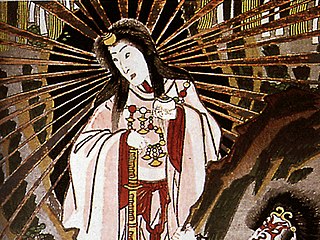Tokoyo may refer to:
- Tokoyo no kuni a realm in Japanese mythology sometimes identified with Mount Penglai in Chinese mythology
- Tokoyo (fictional character), the protagonist of a folk tale
See also:
- Tokyo, the capital of Japan
Tokoyo may refer to:
See also:

Urashima Tarō is the protagonist of a Japanese fairy tale, who, in a typical modern version, is a fisherman rewarded for rescuing a turtle, and carried on its back to the Dragon Palace (Ryūgū-jō) beneath the sea. There, he is entertained by the princess Otohime as a reward. He spends what he believes to be several days with the princess. But when he returns to his home village, he discovers he has been gone for at least 100 years. When he opens the forbidden jewelled box (tamatebako), given to him by Otohime on his departure, he turns into an old man.
Io most commonly refers to:

Japanese mythology is a collection of traditional stories, folktales, and beliefs that emerged in the islands of the Japanese archipelago. Shinto traditions are the cornerstones of Japanese mythology. The history of thousands of years of contact with Chinese and various Indian myths are also key influences in Japanese religious belief.

Omoikane is a Shinto kami of wisdom and intelligence. His name means "having the wisdom and thoughtfulness of many people". A heavenly deity who is called upon to "ponder" and give good counsel in the deliberations of the heavenly deities. In the myth where Amaterasu hid in a cave, he was entrusted with the tasked of finding a way to get her out. Carpenters pray to him during the construction of pillars in a building.
Ebisu, also transliterated Yebisu, may refer to:
Zu or ZU may refer to:

Ugayafukiaezu no Mikoto (鵜葺草葺不合命) is a Shinto kami, and is in Japanese mythology, the father of Japan's first Emperor, Emperor Jimmu.
Toto or TOTO may refer to:
The Dream of Akinosuke is a Japanese folktale, made famous outside Japan by Lafcadio Hearn's translation of the story in Kwaidan: Stories and Studies of Strange Things.

A Story of Oki Islands is a supposed Japanese folk story found in Richard Gordon Smith's 1918 book Ancient Tales and Folk-Lore of Japan. Set in the Oki Islands located in the Sea of Japan, the story portrays Tokoyo as the daughter of an exiled samurai who slew a malevolent sea monster that demanded the sacrifice of virgin maidens.
Ne-no-kuni or Soko-tsu-ne-no-kuni in the Nihon Shoki, also called Ne-no-kata-su-kuni or Haha-no-kuni in the Kojiki, refers to a netherworld in Japanese mythology. It is sometimes considered to be identical to Yomi, another netherworld in the myths as well as Tokoyo-no-kuni. There is no clear consensus on the relationship between these three realms.
Ashina may refer to:
Ko-Shintō (古神道) refers to the animistic religion of Jōmon period Japan, which is the alleged basis of modern Shinto. The search for traces of Koshintō began with the "Restoration Shinto" in the Edo period, which goal was to remove any foreign ideas and worldviews from Shinto. Some movements which claim to have discovered this primeval way of thought are Oomoto, Izumo-taishakyo.
The concept of "marebito" represents a spiritual or divine being that visits from the 'other world' at specific times. This belief, rooted in the welcoming of outsiders as gods from another world, has been an important part of Japanese folklore and customs throughout history. Marebito has been observed in various forms, from gods visiting during festivals to wandering ascetics and itinerant performers being treated as divine beings. Comparative studies have been conducted on the "sacred visitor" among the Germanic and Celtic peoples, highlighting the cultural significance and universality of the marebito belief.
Tanuki may refer to:

Sukunabikona or Sukuna bikona is the Shinto kami of the onsen, agriculture, healing, magic, brewing sake and knowledge. His name means "the small lord of renown." He is often described as being a dwarf and is frequently paired with Ōkuninushi.

Taisho Otome Fairy Tale is a Japanese manga series written and illustrated by Sana Kirioka. It was serialized in Shueisha's Jump Square from July 2015 to September 2017, with its chapters collected in five tankōbon volumes. An anime television series adaptation by SynergySP aired from October to December 2021.
Tokoyo (常世), also known as Kakuriyo (隠世、幽世), or Taikaikan is realm in Shinto. It is an "otherworld" though not necessarily seen as a place in the afterlife, but rather as a mythical realm with many interpretations. It is believed to be a place where various kami and spirits of ancestors live with eternal youth. Motoori Norinaga categorized three types of Tokoyo: a world of perpetual darkness, a world where people never grew old, and a world across the sea.

Tokoyo: The Tower of Perpetuity is a 2022 Japanese side-scrolling action roguelike game developed by //commentout and published by Playism for Windows and Nintendo Switch. Players climb the titular Tower of Perpetuity with the goal of reaching the summit. The game had a mixed reception.